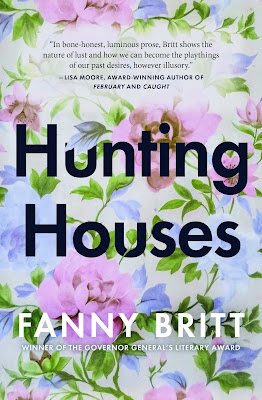 |
| Hunting Houses / Fanny Britt trans. from the French by Susan Ouriou & Christelle Morelli TO: Anansi, c2017. 224 p. |
This Quebec novel has been on my tbr for quite a while. I first read Fanny Britt's graphic novel Jane, the Fox & Me, in 2016 and thought it was delicate and lovely. So this novel intrigued me. Also, the setting -- Montreal -- was definitely a draw.
I liked it, but found that it dragged a bit in the structure. It starts in the present with Tessa, a 37 yr old realtor who is a mother of three. She is meeting a woman to list her house; the couple is getting divorced so want to sell quickly. When Tessa goes back to the house to drop off keys, she discovers that the husband half of this couple is her old lover from 15 years before, one whose absence has haunted her even through her marriage. He asks her for a drink later that week.
From then on, Tessa is in a flap -- she buys a new dress, she imagines running away with him and deserting her solidly loving husband and three boys for a passionate life with this remembered love of her youth. She goes through the motions of her busy life as a realtor and as a parent of three young boys while always thinking about what might happen when she meets Francis again.
But in between all these frantic ruminations, chapters move back to Tessa's childhood, to her experiences with her best friend Sophie and her brother Etienne, with her divorced parents, and her first meeting with Francis and the short arc of their relationship which has left its mark on her.
This feels a bit like linked short stories, but I didn't find the flow as smooth as it could have been. This may have been partly due to the fact that I was listening to this one as an audiobook so couldn't flip back and forth to orient myself as the story changed. Also, I found the narrator distracting; she would pause in the strangest places and phrases would be split up oddly. It was a bit discombobulating to listen to.
What I really liked about it was the initial set up and the pace of Tessa's life in Montreal. I enjoyed the setting a lot; recognizing places and expressions and local prejudices was fun. In the final pages, Tessa and Francis finally meet up -- when they had first met, a shared love of Leonard Cohen was something they remarked on, so here they decide to meet again in Parc du Portugal, a tiny parkette that looks onto Cohen's housefront. I know it does, as the last time I was in Montreal, my husband and I happened to sit in that park and look up at Cohen's old residence ourselves.
Tessa and Francis, however, decide to have a drink and try to recapture old times. It doesn't work out quite like Tessa had been dreaming; and that final chapter was one of the strongest parts of the book, I thought. I liked the realism of this meeting - the locale, the awkwardness, the conversation, it all worked very well. Everything that had previously been shared about Tessa in all those stories of her childhood, adolescence and married life merge and the conclusion makes a lot of sense.
There is some sorrow in this book; loss and mourning of many kinds. There is also solidity and strong love shown by a few different characters -- marital, parental, or friendship. I thought that this balance was interesting and appealing. There's certainly discussion to be had in this book, about motherhood, career choices, passion, commitment, self-knowledge, and more. It's serious but also feels grounded in daily life. Overall, I liked it, but I think the setting was personally more intriguing than the main character.
No comments:
Post a Comment
Thanks for stopping by ~ I always enjoy hearing your comments so please feel free to leave some!